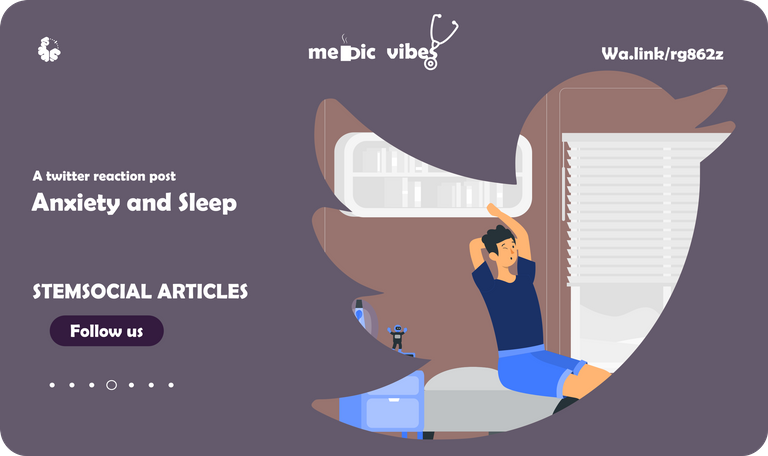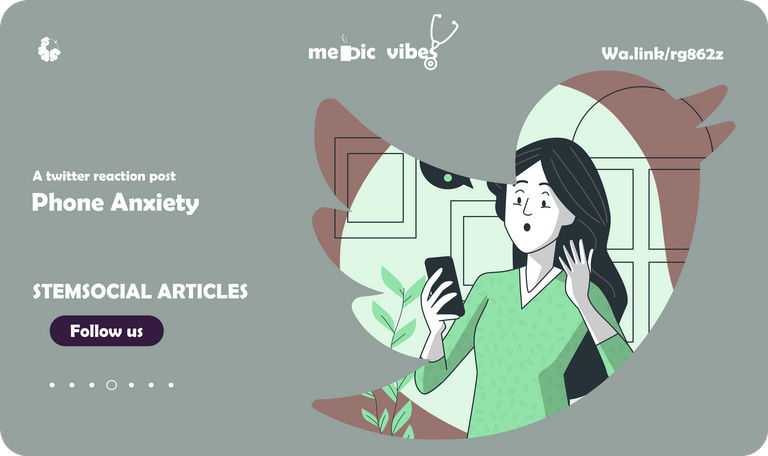Anxiety and Sleep (A Twitter Reaction Post)

Depression vector created by pch.vector - www.freepik.com and Inkscape.org
not being able to sleep bc you have anxiety is the absolute worst
— jai ciera (@kingJaiiii) September 9, 2022
In the last post, we talked about how phone anxiety can affect people particularly millennials and baby boomers as seen in a study that was done. They mostly practice avoidance whenever the phone rings or they have to make a call. Oftentimes, they opt for text messaging to avoid talking to people. Because the reason for the anxiety stems mostly from how people see them rather than an actual fear of the phone, phone anxiety is seen as social anxiety.
As with other forms of social anxiety, the management is typically some form of exposure therapy. The patient may also benefit from other therapy like psychotherapy and pharmacotherapy.

Depression vector created by pch.vector - www.freepik.com and Inkscape.org
phone anxiety and expecting an important call pic.twitter.com/ySkUexhA5B
— ordinary life of a Blue Cat (@BlueCat_Friend) September 9, 2022
In this post, we want to see the relationship between phone calls and anxiety and it falls more into the class of social anxiety which we have already discussed than a phobia. This is a very interesting topic among anxiety disorders. There is always one phobia or the other that comes out with its new name and people are surprised by its existence. After that, we will talk about how to get over phone call anxiety.
Good day, I hope you are having a good one, this is the Medic Vibes blog where we help each other stay up to date with mental health topics. This blog is being hosted by @ebingo, he is a medical doctor and an illustrator. We are yet to move to our main blog because as it is we just have one writer and illustrator. We currently blog on the STEMsocial community. Last month we talked about depression and this month is all about anxiety. Last month just like this month we started with a study that was done in Nigeria, this month it found a 50% prevalence of anxiety in a youth camp. Just like last month after the study, we started looking at Twitter posts and that is what we are doing right now.
Hello everyone, hope you are having a nice evening, My name is Ebingo Kigigha, and I am a medical doctor and creative. I am the main writer for Medic Vibes. In this blog, we look into mental health topics and try to understand them and discuss them here on STEMsocial. Community. We have been posting for a month plus now and it has been one topic to another, starting from a study to tweeter posts. Last month it was all about depression while this month is all about anxiety. We posted about a study that showed a 50% prevalence of anxiety in a youth camp and now we are reacting to Twitter posts.
Anxiety disorders are mental health issues that cause a person to be more worried and afraid. This condition can affect most people but it is more likely to affect the younger population.
For example, a study we looked at saw that nearly 50% of those in a youth camp in Northwest Nigeria were dealing with anxiety. In the whole of Nigeria however not up to 1% of Nigerians deal with anxiety and in the world, it is somewhere around 3%.
Everyone at some point in their lives knows the feeling of their heart racing for a big test or a presentation or a performance. But what if I told you that some people constantly feel that way on a daily bases? In social anxiety, the fear people deal with is that people might be judging them. The people in question are people they may encounter on a daily bases such as a boss, or a co-worker. Because of this people will practice avoidance. In our last post, we saw how people who are dealing with social anxiety can have it translate to situations on phone.
The above physical symptoms and other symptoms that can be present are psychological symptoms such as insomnia, flashbacks, nightmares and others.
People who have anxiety have physical symptoms, psychological symptoms, and reactionary symptoms.
The physical symptoms include stomach pain, chest pain, weakness and fast breathing and fast heartbeat. These are typically revealed to the sympathetic firing of the autonomic system.
The psychological symptoms of anxiety include sleep problems such as insomnia as we will discuss today, flashbacks and nightmares.
The reactionary symptoms are things like avoidance and this can be seen in social anxiety and post-traumatic stress disorder.
The diagnostic and statistical manual says that the reason for the anxiety switches from one topic to the other, it is persistent for over 6 months. There is difficulty in controlling it. Physical symptoms such as pain tiredness, jitteriness, and sleep symptoms are usually present and one of which is always present in children's anxiety.
Depression and Anxiety have a relationship where one can cause the other, and it is important to monitor these changes when they start occurring because depression puts a person at risk of suicide.
Anxiety and Sleep

People illustrations by Storyset
<asignificantlyhttps://storyset.com/people">People illustrator rations by Storyrelationshipe
In a post by Sleep Foundation, they discuss the negative cycle of anxiety and sleep and sleep and anxiety. When a person is going through anxiety, they usually have issues with falling asleep and at the same time, sleeping less when a person has anxiety can make the anxiety worse.
NCBI explain this in the publication a mind ruminating on thought and is hyper-aroused, has a reduced chance of sleeping. This type of state of mind has been found in most cases of anxiety.
Insomnia is more common in patients with Generalised Anxiety, Obsessive Compulsive Disorder and Post Traumatic Stress Disorder.
Anticipatory anxiety is also common when the subject knows the difficulty he or she experiences with going to sleep and before they get to bed they start having anxiety.
As if the condition was not already worse, those dealing with anxiety and sleep issues are also likely to develop depression.
Tips
The good news is that anxiety is more treatable when compares with other mental health disorders.
A person who has these symptoms persistently for over 2 weeks should seek out medical care.
Cognitive behavioural therapy also known as talk therapy is an effective therapy for this condition. People can be placed on the antianxiety drug, anti-depressant and sympathetic nervous system blockers known as beta blockers.
Building a regular sleep-wake schedule has also been known to be beneficial for dealing with insomnia in anxiety but also anxiety itself.
As mentioned previously in these posts, avoiding alcohol and caffeine has also been proven to be effective in combating this form of insomnia.
Hive stories
In this blog post by @ilazramusic, they describe what love is like from the eyes of a person who is anxious so you can understand what it is like building a relationship with a person who is dealing with anxiety. The post is based on a current life event and could be helpful for those trying to know more about anxiety.
To know more, read here.
Questions
- What did you learn about sleep?
- What did you learn about anxiety?
- What are your thought on the effects of anxiety?
- What are some substances to avoid when dealing with insomnia?
Conclusion
Anxiety and sleep have a simple relationship where either one can cause the other while simultaneously causing depression and other mental health issues. While CBT might be helpful, it is very important to avoid substances such as alcohol and caffeine.
I hope that you learned a lot from this post.
To book me for illustration gigs click Here
Congratulations @ebingo! You have completed the following achievement on the Hive blockchain and have been rewarded with new badge(s):
You can view your badges on your board and compare yourself to others in the Ranking
If you no longer want to receive notifications, reply to this comment with the word
STOPCheck out the last post from @hivebuzz:
Support the HiveBuzz project. Vote for our proposal!
Thanks for your contribution to the STEMsocial community. Feel free to join us on discord to get to know the rest of us!
Please consider delegating to the @stemsocial account (85% of the curation rewards are returned).
You may also include @stemsocial as a beneficiary of the rewards of this post to get a stronger support.
Morning running/jogging also helps with sleep and anxiety.
Very true..I usually add that
I am wondering how anyone could escape the sleep-anxiety cycle that you mentioned in this blog. Is it any easy way out? I assume checking this out with a therapist may be the way to go. Is this correct?
Yeah...therapy helps...but a healthy life style in general could put you on the right track.
say exercise, healthy diets and meditation
Meditation is something I have often heard about, but which I have no clue how it could help in practice... Any information on that part?